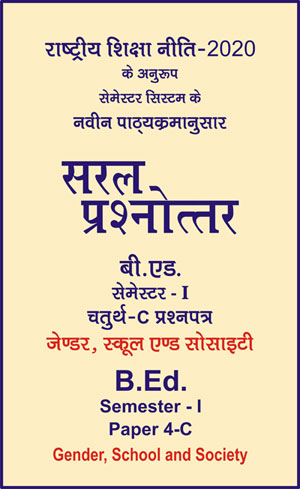|
बी एड - एम एड >> बी.एड. सेमेस्टर-1 प्रश्नपत्र-IV-C - जेण्डर, स्कूल एण्ड सोसाइटी बी.एड. सेमेस्टर-1 प्रश्नपत्र-IV-C - जेण्डर, स्कूल एण्ड सोसाइटीसरल प्रश्नोत्तर समूह
|
5 पाठक हैं |
||||||
बी.एड. सेमेस्टर-1 प्रश्नपत्र-IV-C - जेण्डर, स्कूल एण्ड सोसाइटी (अंग्रेजी भाषाा में)
Question- How does the school formulate the behaviour norms of the child?
Related Short Answer Questions
- How does the knowledge acquired in school affect the child?
- Who was given the name of small society? Tell
Answer -
As soon as the child studies, he is sent to school, where his contact with others also increases. A child’s first day at school is one of the rituals of entry into the middle-level unit. It is pertinent to remember that the socialization of children occurs at a very rapid rate from infancy to adolescence with family and peers trying to exert maximum influence during the early stages of infancy. Therefore, it is the school which formulates the behavioural norms of the child.
School refers to a whole range of formal educational institutions. In the words of Bubaker – “School is an active, direct and formal agency of education and socialisation.” School is generally understood for the purpose of ‘outer society’. The school should be seen as keeping alive the values of the society which is continuously striving to take the humanity to higher levels of moral, intellectual and aesthetic development through the children. Schools provide both formal and informal situations to the students. The formal situation is provided in the classroom while the subject matter of socialization is determined by the curriculum and teaching-learning process. The informal situation can be seen in the interpersonal relationships of students with teachers and peers.
School is a small society where children from different families, different religions, different castes and economic strata live together, participate in group activities and learn to adjust with the society. Whatever the child has learned in school through the family, peer group or community, becomes permanent.
As you can see, in school, children are socialized with the aim of preparing them for life and the role they play in the world beyond small units. Schools select young people in the role of adults, who are considered suitable for them; At the same time, they have to be taught ethics and skills, which match these ideas.
The socialization provided by the school not only helps the growing children to gain academic insight but also many values like importance of punctuality, discipline, flexibility, group work and cooperation etc. Another important role played by schools is in relation to gender socialization. Although the first education of gender comes from the family, yet in school the child understands its various dimensions. At this stage, the school becomes the most important agency; Simultaneously he is introduced to the peer group in the school and the neighbourhood.
The school system works within the society and fulfills the demands of the society. This serves the purpose of a catalyst. It investigates exactly when reform and impetus are needed so that the cultural values of the society do not fade away. Children who are excluded from schooling will have only a narrow sociality with areas of significant interaction, exposure and extensive socialization, unlike their counterparts in schools.
Indirect curriculum is also used as a vehicle for socialization in school. Indirect curriculum refers to what children learn apart from the academic content, what they do or what they are expected to do. Teachers and peers shape children’s attitudes about social class and gender, etc., which are reflected in their behaviour. Thus, the school as an agent plays a decisive role in the socialization of children by reinforcing the habits, values and norms acquired from the family and at the same time exposing them to new areas of thought and action.
|
|||||













